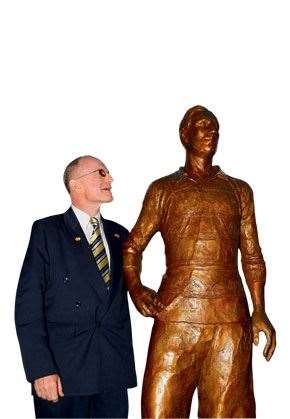Rugby League may never have taken root on Australia’s eastern seaboard had it not been for “The Master”.
Rugby League may never have taken root on Australia’s eastern seaboard had it not been for “The Master”.
 Dally Messenger: rugby league’s first idol
Dally Messenger: rugby league’s first idolImage: Getty Images
Dally Messenger was both a pioneer and an innovator. “The Master” didn’t just defect to rugby league; he was instrumental in its creation. Messenger – named as if some kind of marketing contrivance – showed the world what was possible in the new game. While he played, the name of this magnificent athlete was synonymous with the sport.
Herbert Henry Messenger, born in 1883, had talents that enabled him to be an innovator as a rugby player as soon as he began playing. At 173 cm and around 80 kg, he was muscular, explosive and unpredictable. He played a brand of football that would be admired even today. He was unorthodox but extremely fit, strong, quick and smart. These attributes allowed him to intuitively act out his vision in ways that baffled opposition and, often, teammates.
Not that it mattered to him that teammates didn’t know what he was doing. It’s said that his catch cry, even as a second-grade rugby union player in 1905, was, “just bung the ball out to me, boys, as quickly as you can”. Once he had the pill, everyone on the field would practically be reduced to spectators as this swerving, jinking, diving, kicking, bullocking genius pulled off one outlandish move after another. He’d pile up the points, then kick the goals. In fact, he was renowned for potting uncanny goals from any angle and any distance.
Few Australian sportsmen dominated their sport in the Bradmanesque manner Messenger did. And, like Bradman, he was good at every sport that took his fancy. For seven years, he was catamaran champion of Sydney Harbour and Australian Long Oarsman champion. He also excelled at cricket.
Messenger went on to play first grade with Easts and international rugby, as a stand-off, centre, winger and just about any other position he so desired. Even opposition fans loved the brilliant antics of this quiet, humble man who played like an extravagant extrovert. His audacious trickery and outlandish skill drew vast crowds. They laughed as he carried the ball behind his back; gasped as he dived over defenders’ heads to score.
Messenger’s mastery of all skills associated with an inflated ball (except the round ball – he curiously considered soccer degenerate) led him to take an interest in other codes, and he was an ardent fan of Australian Rules. In fact, he toyed with the idea of creating a code that incorporated the skills and rules of rugby and the southern game. His plan was blocked by parties on both sides.
It’s easy to see the possibilities a consortium, consisting of cricketer Victor Trumper and J.J. Giltinan, saw in Messenger when they sought his signature for the proposed new professional game of rugby league, in 1907. Today, code-switching is de rigeur. Back then, Messenger’s desire to be paid for what he did was considered mercenary. When he switched, the Rugby Union struck every game he played from their records. Believe it or not, they were only restored a hundred years later, in 2007.
Messenger wouldn’t just play the new game – he would define it. He quickly found ways to exploit the code’s developing rules, and the rule-makers had trouble keeping up with him.
Once, in a single game against South Sydney, he scored three tries, and every one of them led to a rule change. In the first, he kicked , sprinted off the field, around the defence, back onto the field, gathered and scored. In the second, he punched the ball ahead, gathered and scored. The third was scored when a scrum collapsed, and he ran over the top of the forwards, who were tangled prostrate on the turf!
In the rush of representative matches designed to establish rugby league’s profile, Messenger captained the Kangaroos in his five matches, and NSW against QLD. The English were astounded at his feats. One English newspaper described a Messenger goal: “Quite a sensation was caused…when Mr Messenger kicked from the 75 yards mark and secured a goal.” During that 1908 tour, he scored a try that most eyewitnesses described for decades afterward as the greatest ever witnessed.
In the early days of the professional code, he represented New Zealand, and later represented QLD against the Kiwis. With irrepressible, bamboozling football, he led Easts to three consecutive Premierships in 1911-13. In 1911, he scored an amazing 270 points. By that time, the new code had become the dominant winter sport, and Messenger was its poster boy. That all-round sporting genius wasn’t the only similarity he shared with Bradman. The English papers used to trumpet “Messenger is Playing” just to get the crowds in.
At the time of his retirement in 1913, Messenger had played more union than league. But thanks to him, the new sport captured the public imagination. At a time when brilliant action was required, the Messenger was always going to deliver.
-Robert Drane
Related Articles

Viva Las Vegas: Join Golf Australia magazine's Matt Cleary on a golf and rugby league spectacular

After late change dad watches Cam’s major from afar
.jpg&h=172&w=306&c=1&s=1)












